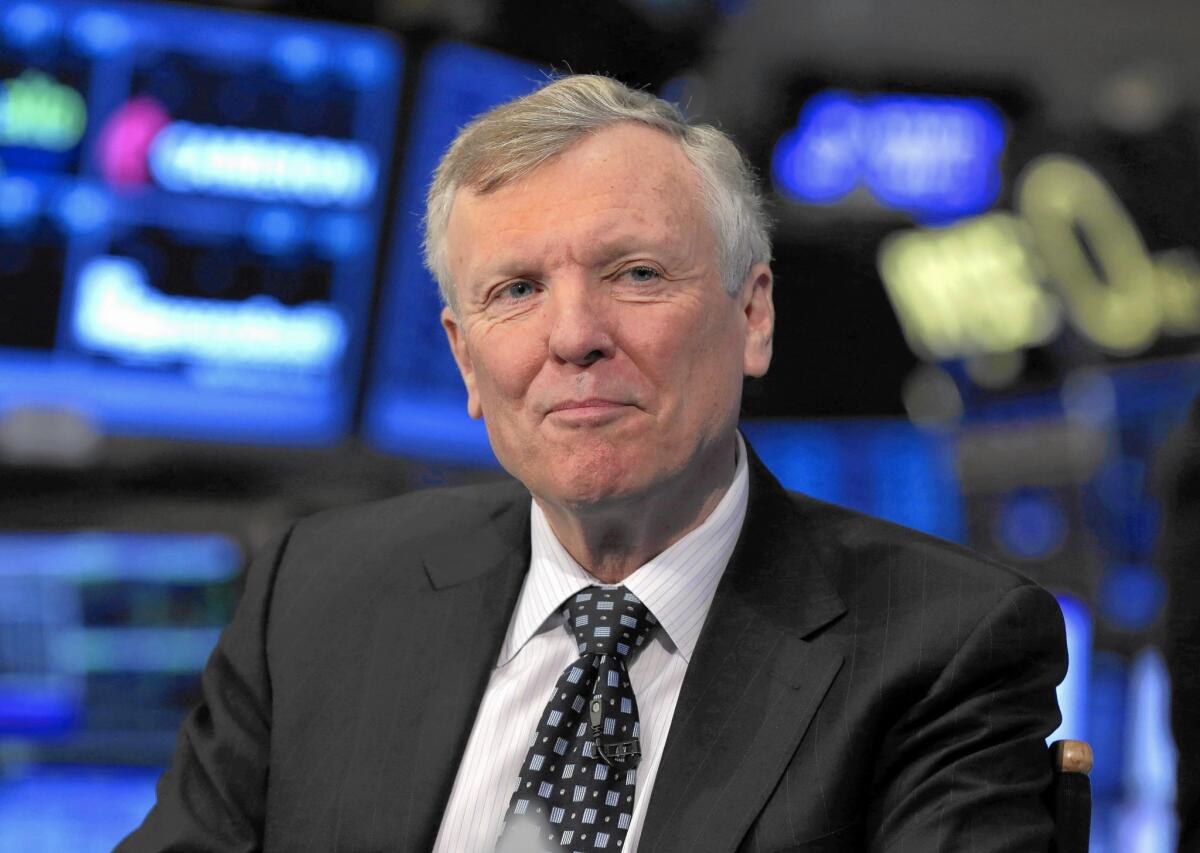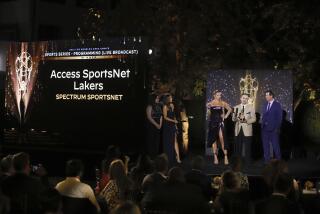Better broadband at better prices? Welcome to Charter CEO’s fantasy

- Share via
To hear the chief executive of Charter Communications tell it, his company’s acquisition of Time Warner Cable will mean a better broadband experience for all.
“We’ll offer consumers a broadband product that makes watching online video, gaming and engaging in other data-hungry applications a great experience, including at peak times,” Tom Rutledge said after the planned merger was announced Tuesday.
In short, he said, consumers can look forward to “better products at better prices.”
As best as I can tell, he wasn’t trying to be funny.
“When it comes to cable consolidation, history teaches us to be very concerned about the benefits for consumers,” said Delara Derakhshani, policy counsel for Consumers Union. “Prices for cable and broadband continue to go up, and customer service is dismal.”
Oxnard resident Barclay Totten has similar concerns that highlight some consumers’ questions about the broadband market.
He received an offer from Time Warner Cable recently to more than double his broadband speed for an extra $10 a month.
Wait a minute, Totten thought. Doesn’t the government have rules about that?
He went to the website of the Federal Communications Commission, where he learned that service providers such as Time Warner Cable and Charter can’t “block, impair or establish fast/slow lanes to lawful content.”
Totten filed a complaint with the FCC saying that charging a higher price for faster service was tantamount to creating a broadband fast lane. The agency, he said, never responded.
It’s an intriguing issue. However, what it shows isn’t that Time Warner and other service providers are pulling a fast one but rather that many people still have a hard time grasping the concept of network neutrality laid out by federal regulators in recently adopted rules.
Joe Ridout, consumer services manager with the advocacy group Consumer Action, said Totten’s complaint wasn’t unusual.
“Consumers don’t know why some Internet speeds are slower,” he said. “These rules are not very well understood.”
Kim Hart, a spokeswoman for the FCC, told me that the agency’s so-called open Internet rules prevent Internet service providers from “giving priority to online content or services in exchange for payment” or from favoring their own content over that of competitors.
“It is not a violation of open Internet rules for an ISP to give customers the option to pay a different price for different tiers of Internet service, allowing consumers to choose the plan that is right for them,” she said.
Look at it like this: The FCC’s rules say cable giant Comcast, for example, couldn’t charge Netflix a higher price for smoother service so that it can better compete with Hulu, which Comcast co-owns. Both services must be accessed equally by consumers.
However, the rules don’t apply to service providers charging people more for faster Internet access.
“A lot goes into the price of Time Warner Cable Internet plans,” said Dennis Johnson, a company spokesman. He cited “network management and investment and the support needed to deliver reliable service.”
That’s why consumers should be wary when Charter’s Rutledge proclaims that broadband service is about to become better and cheaper.
Charter would be picking up about $23 billion in debt from Time Warner Cable and would have to borrow an additional $25 billion or so to finance the deal.
It’s fair to wonder where the company would find money to maintain and invest in its networks, plus lower people’s monthly bills.
For that matter, Totten was correct to ask why faster broadband costs more. Fast, slow — service providers spend about the same in delivering broadband to customers.
Terry Koosed, president of Bel Air Internet, said residential customers should think of broadband as a data fire hose blasting into their neighborhood. Everyone, in theory, could hook up and have the fastest speeds possible.
“But if that happened,” he said, “the system would crash. So it has to be managed.”
Cable companies do that, Koosed said, by slowing the service of lower-paying customers and speeding up the service of those willing to shell out more money.
And why do top speeds cost so much? Because cable companies can get away with it.
“It’s a matter of what the market will pay,” said Angel Barragan, project manager for broadband provider Fireline Network Solutions in Santa Fe Springs. “All we have to do is step on the accelerator.”
If the Charter-Time Warner Cable deal goes through, the merged company will join Comcast in controlling roughly 75% of the cable broadband market nationwide.
You read that right — three-quarters of the cable Internet market controlled by just two companies.
And those two companies would be within their legal rights to charge as much as they could for service.
So Totten may have had a faulty grasp on net neutrality when he complained to the FCC about not receiving the fastest speed available at the best possible price.
But he was voicing a concern I think we all share. Ongoing consolidation among pay-TV companies means fewer choices for consumers, and fewer choices almost always means higher prices.
I dare Rutledge to prove me wrong.
But wait
There’s more! I’m now also writing a weekly Business Section newsletter, which you can receive in your inbox every Monday. To sign up, go to http://mediakit.nohib.com/businessconfidential.
David Lazarus’ column runs Tuesdays and Fridays. He also can be seen daily on KTLA-TV Channel 5 and followed on Twitter @Davidlaz. Send your tips or feedback to [email protected].
More to Read
Inside the business of entertainment
The Wide Shot brings you news, analysis and insights on everything from streaming wars to production — and what it all means for the future.
You may occasionally receive promotional content from the Los Angeles Times.










